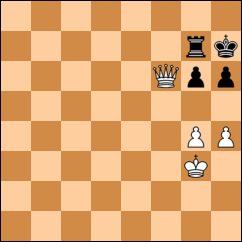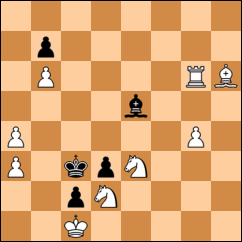We are reconstructing the life and chess of Louisa Matilda Fagan (1850-1931). Not that we are the first to do so: Batgirl here, and Francesco Gibellato via here (but in Italian) have done their bit: although (I think it is safe to say) not in as much detail either chess-wise (to which this and the previous episode of this series are devoted), or biographically (which we will get on to next time).
Last episode we left Mrs Fagan at the end of 1897 (and now 47) as she crested the wave of her chess success, which she would surf for several years yet - though the detail becomes more sketchy. Her first tournament outing in 1898 was at Craigside in January - described by the BCM in the manner of a tourist brochure: "play took place in the Craigside Hydro, which is situated in a picturesque spot on the slopes of Little Orme's Head at Llandudno."
 |
| "A picturesque spot." We have passed this way before. |
Mrs Fagan and Miss Finn returned to Craigside the following year, and were again unsuccessful in a field of ten (Belfast Newsletter 12 January) - though there are no reports of tummy trouble that year. Undaunted the duo was back yet again in 1901 with Mrs Fagan managing second place at her third attempt (6/8) and Miss Finn third (5/8) (Sheffield Daily Telegraph 7 January). But whatever their uneven results: overall "the annual tournament at Craigside affords a happy meeting place for a number of strong amateur players..." observed Gunsberg in a column in the Penny Illustrated Paper (26 January 1901), and accordingly the ladies might have found company, as well as tea and sympathy, in the salons of the Hydro.
Mrs Fagan competed elsewhere, of course, and below we will continue to follow her tournament fortunes before coming back, lower down, to her other chess activities.
With this success Mrs Fagan made a quite a splash on the other side of the pond where the American Chess Magazine put her on its first page, not missing the opportunity to showcase two ladies:
Sadly, Miss Prothero was to pass away the following year, when Womanhood (October 1899 - extracted by Batgirl) applauded her good works, her "rich contralto voice [and her] many beautiful compositions".
And this is what the American Chess Magazine said about Mrs Fagan:
"...quite the surprise of the tournament was the splendid performance of Mrs. Fagan, who by accurate and brilliant chess achieved the fine score of nine wins out of eleven games played. This lady's photo is enclosed. She is generally regarded as the strongest known lady player, and in the opinion of more than one chess master, who has witnessed her play, cannot be ranked other than on the border line dividing first and second class amateur form."Yes: "...generally regarded as the strongest known lady player..." - quite a billing that may explain the curious interest she attracted at a Midlands County Championship Tournament in Birmingham in April the following year, where she again played with her companion from the LCC, Miss Finn, in Class II.
 |
| BCM October 1904 |
She was to be the direct beneficiary of this masculine regard for the "fairer sex" (as they would have casually put it in those days) when she played in the Kent CCA Annual Congress at Rochester in June 1900. It was a popular event with three tournaments laid on for those "crowded out of the championship contest" (MPost June 11). Mrs Fagan tied for first place in Section A of the secondary event with two gentlemen, "who resigned in favour of the lady". The "chivalrous" (BCM July) gesture of Messrs Brooke and Chapman left her the sole prize winner, and rewarded them with a secure place in the chronicles of gallantry. Miss Finn won Section B. At the prize presentation, Dean Hole (of Rochester Cathedral) quite properly congratulated the winners, but wandered off piste rather, when (according to the Morning Post), he "made some interesting observations on the surrender of Pretoria" - that would have been by the Boers to the British in the second Boer War, at around the same time as the Brits were inventing the first-ever concentration camps down there in South Africa.
A cold shower, though, for Mrs Fagan in Bath in September when she finished 9th/12 in the Class II tournament (Birmingham Daily Post 18 September 1900) - tempered by a success at Craigside in January 1901, as we have already noted, and 2nd place (with 6/8) in the Second Class Tournament in May at Folkestone (given by Batgirl) - this time Miss Finn had her day (again), and came first. Of Miss Finn in 1904 winning the first British Ladies, Sargeant remarks (in his Century of British Chess) that "she was admitted to being the one of the best women players of her day, if not quite the equal of Mrs. L.M.Fagan."
Mrs Fagan's tournament appearances appear to be less frequent (or less documented) in the ensuing years - she was 50 at the turn of the century. There was some mild controversy - deriving it seems from a remark by Gunsberg - over her non-appearance in 1905 at the British Ladies Championship (which we will come back to); and she played in a one-week tournament in Shrewsbury alongside the British Championship (Guardian August 16) the same year; and since Gunsberg's name has come up, here is the conclusion of their game in a knockout tournament at Hastings in 1909 (Guardian June 8 - Gunsberg's own column). He wrote: "There is nothing so amusing and gratfying [sic - typical Gruaniad, even then] to a player as a stalemate, by which an otherwise lost game is converted to a draw." Over to you to try and breach the fortress otherwise.
 |
| Mrs.L.M. Fagan v I.Gunsberg. Hastings Knockout tournament, 1909. "Black played 1...P-Kt4, and there followed 2. P-R5, R-Kt1 3. K-B3, R-KB1, and draws by stalemate if QxR" |
So along with her tournament appearances she was all the while playing on board 1 for the Ladies in the London League, as the few reported results for 1898 show (+2 =1 -0). Helpfully the Chess Amateur gave a summary statistic of her performance in the 1899/1900 season: she played in 10 of their eleven matches with a 60% score. One of her victories was in the match against Shuttleworth when she "had the satisfaction of winning from their champion, Mr Harold Jacobs" (Womanhood December 1899 - extracted by Batgirl; also reported MPost 23 October). Harold was younger brother of the stronger Herbert - both of them sometime members of Brixton CC - and also an officer of the Surrey County Chess Association. He drops the exchange, and more follows (game is best viewed via Google Chrome).
 |
| Mrs L.M. Fagan. Sunday Times September 18, 1917 Mate in 3 Solution in Notes. With thanks to Meson |
Mrs Fagan's appearances for LCC on board 1 continued to be reported intermittently, and the last one that I could find was in 1906 (0.5 v Mrs Gattie of Brighton Ladies; BCM); she had been throughout a solid supporter of the Ladies Chess Club - not only filling the board 1 spot, but also taking part in internal events and holding club office. Thus she won a LCC tournament in 1896, and a Summer tournament in 1898; was second in a double round Club Championship in March 1901, was first in Summer 1902, and first equal with Miss Finn in 1903. In 1904 came this: "Mrs Fagan has established herself indubitably as the champion of [the LCC] by gaining her third successive victory, with a score of 5.5 out of 7" (Leeds Mercury 30 April).
The Ladies Club seems to have had a social whirl second to none: no anniversary of its founding passed unmarked. For example: 200-300 members and guests were present at its 4th birthday "At Home" celebration in April 1899 , reported the Morning Post (3 April), where Mrs Fagan was seen to be playing "alternating games" with Miss Finn, Dr Ballard, and Herr Lasker, no less. In 1911 she was elected co-vice-president along with Miss Finn (who had some years earlier won the first two British Ladies Championships in 1904 and 1905). We should mention, for completion, that she had also joined Hampstead CC in November 1901, winning 5th prize in their Summer Continuous Tournament in 1903 (both from BCM).
Mrs Fagan was now something of the Grande Dame of British chess, and it would have been natural - expected even - that she should be called upon to speak at the Dinner held on Thursday evening at the combined Kent and Sussex Chess Congress in Hastings on 12th to 17th May 1913 - as was fulsomely covered by the Hastings and St. Leonards Observer 17 May 1913. The same edition, by the way, reported that following the Friday round Mrs Fagan had won the evening tournament with 4/4 with one to play. In the First Class Open Tournament F.D.Yates had won 10 games in succession, and was also declared the winner one round in advance.
"Congress Dinner - Humorous Speeches" reported the Observer with the Mayor presiding, and he duly proposed a toast to "The Kent and Sussex Chess Association". After some mutual back-slapping in recognition of a successful event run with "admirable smoothness and perfect organisation", Mr Densham (a competitor in the Second Class tournament) proposed the "perennially popular toast of 'The Ladies.' (Hear, hear.)"
Mrs Fagan responded:
"Being, like all the rest of her sex, of a humble and law-abiding disposition - (laughter) - she felt it an honour to follow the superior sex in regard to the toast. The men who played chess seriously were a superior and splendid body. (Laughter and applause.) While many careers were closed to women, in the realms of chess they had been welcomed, she might almost say WITH OPEN ARMS. (renewed laughter and applause.)" [Caps in original.]Amid all this light-hearted banter there was a serious note: the political context of the time - Suffragette agitation for the vote - had seeped even into the inner sanctums of the Hastings Chess Club. Events were certainly exercising the Mayor:
"[He] had an idea that Mrs Fagan had strong opinions - (laughter) - but her remarks that night had been entirely conciliatory. The proceedings of some ladies were causing anxiety, and if Mrs Fagan could use any influence he would be greatly indebted to her. The worst of the ladies was - it was not confined to chess players - one never knew what their next move was going to be. (Laughter.)"This unexpected collision - of Mrs Fagan's chess career with her reputation for firm convictions on wider issues - is a convenient place to end this review of the former. We will move on in the next episode to examine her biography beyond the chess board, and what we know about her "strong views".
Notes
Key to Problem 1. Bf8!
Earlier and later episodes:
Part 1. Waltzing Matilda; 2.Mrs Fagan's Game; 4. Mrs Fagan's Family; 5. Mrs Fagan's Politics; 6. Another Mrs Fagan...and Her Politics. Part 7...And the Final "Mrs Fagan"
For all chess history posts in a previous incarnation go to the Streatham and Brixton Chess Blog History Index.

No comments:
Post a Comment